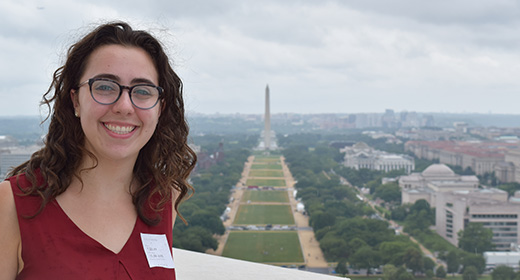
This summer students were scattered around the country and across the globe getting first-hand professional experience during their summer internships. Students are sharing their experiences through InternGrams, a recap of the what, where, and wow of their experiences.
Name: Grace Hermann BA ‘21
Organization: United States Capitol Historical Society
Location: Washington, D.C.
In her closing remarks for her address to the 116th Congress, historian Dr. Joanne B. Freeman honored the past, stating “I want to close with the words of Aaron Burr, ‘[Congress] is a sanctuary; a citadel of law, of order, and of liberty; and it is here — it is here, in this exalted refuge; here, if anywhere, will resistance be made to the storms of political frenzy and the silent arts of corruption; and if the Constitution be destined ever to perish by the sacrilegious hands of the demagogue or the usurper, which God avert, its expiring agonies will be witnessed on this floor.’”
This past summer I was incredibly fortunate to have interned at the U.S. Capitol Historical Society. Although it may not be considered a typical “Hill job,” this busy nonprofit was nestled in the heart of the nation’s capital. Every day I was able to walk past the Capitol building, the Supreme Court, and the various House and Senate office buildings where many of my peers interned. Unlike my friends however, I worked for a bipartisan nonprofit and was in the unique position of observing Congressional activity from both sides of the aisle, and, more importantly, with an eye to the past.
While interning for the Society, I was lucky to have been able to help organize and attend multiple events, including book talks where I met and spoke with nationally renowned historians and professors, as well as Congressional receptions, including the one where Dr. Freeman spoke.
From my own research projects for the Society, as well as the multiple book talks and receptions, I learned a lot about the history of our Capitol, which has always been the epicenter of one controversy or another. This probably does not shock anyone who has taken a history class, however, what is often left out of the history books is just how divisive some of these policy-shaping controversies were. At our largest event, a reception for the 116th Congress, Dr. Joanne B. Freeman reminded the audience that between personal verbal attacks, physical brawls, conspiracies, revenge, and even murder, it is safe to say, that despite how dire and divided we are, our leaders have come a long way since 1775. I took solace in this lesson after many nights spent with my friends who were always recapping the day’s latest political drama.
Outside of my historical research I was able to help run social media, draft press releases, and go on office outings such as a trek to the top of the Capitol Dome, and getting behind-the-scenes tours of the Capitol Building. I even made a few appearances on C-SPAN. I was so fortunate to have worked with all of the amazing people at the U.S. Capitol Historical Society, and am excited to return to Ann Arbor with a greater understanding of how history shapes and informs public policy—and how we as a nation continue to make history every day.